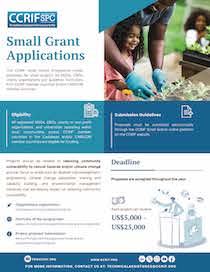Grand Cayman, Cayman Islands, July 29, 2022. CCRIF SPC is pleased to announce that its member governments have renewed their parametric insurance coverage for tropical cyclones, excess rainfall and earthquakes, and the fisheries sector for the policy year 2022/23, which began on June 1, 2022. For the earthquake, tropical cyclone and excess rainfall policies, members ceded over US$1.2 billion in coverage – an increase of 10 per cent over the previous year. Thirteen member governments increased their coverage compared with the 2021/22 policy year. The renewal and demand for increased coverage by members illustrate that countries continue to recognize the critical importance of financially protecting their economies against natural disasters, especially in the context of the increasing frequency and intensity of natural hazards.
CCRIF continued to work with development partners to explore opportunities to support its members to retain and increase coverage. The World Bank, in partnership with (i) the European Union (EU) through its Caribbean Regional Resilience Building Facility (CRRB) managed by the Global Facility for Disaster Reduction and Recovery, made available additional grant funding to CCRIF SPC to support eligible Caribbean countries; and (ii) the EU, Germany (through KfW Development Bank and Federal Ministry of Economic Cooperation and Development (BMZ)) and the United States Treasury (UST), through the Central America and the Caribbean Catastrophe Risk Insurance Program, made available additional grant funding to CCRIF SPC to support Central American members.
For the 2022/2023 policy year, and thanks to the support of development partners, CCRIF offered its members the option to reduce the cost of their policy premiums or to increase coverage or both by approximately 11 per cent for tropical cyclone policies and 24 per cent for excess rainfall policies for the Caribbean and 15 to 30 per cent to Central American members. In addition to this support, CCRIF also provided discounts to its members as an incentive to increase coverage, including a discount to members on any increased coverage over the previous policy year (2021/22) for tropical cyclone and earthquake policies.
In previous years, CCRIF SPC offered similar discounts to its members as part of its support to the COVID-19 pandemic response of member governments. For instance, for policy years 2020/21 and 2021/22 CCRIF SPC, with support from the EU’s CRRB and the Central America and the Caribbean Catastrophe Risk Insurance Program, was able to give countries the option to increase coverage or reduce premium payments by up to 23 per cent for the Caribbean and up to 50 per cent for Central America.
Additionally, CCRIF provides sales discounts and incentives each year to its members, given that it operates as a development insurance company, and has a strong interest in its members’ ambitions to advance sustainable development, recognizing that parametric insurance coverage is key to reducing budget volatility following natural disasters.
Further, the World Bank provided premium support to pilot countries Grenada and Saint Lucia for a fourth year for their 2022/23 COAST policies. COAST is designed to support the fisheries sector and fisherfolk following climate-related disasters. The World Bank has been providing premium support to these two countries since COAST was introduced in 2019.
CCRIF’s value to members is continuously demonstrated through its quick payouts following natural disasters, allowing governments to address their most pressing needs, including support to vulnerable communities. CCRIF made payouts to three members during the 2021/22 policy year – a payout of US$40 million to the Government of Haiti after the earthquake in August 2021, and payouts to Barbados after Tropical Cyclone Elsa and Trinidad and Tobago following heavy rains in August 2021. The payout to Haiti represents the largest payout that CCRIF has made since its inception in 2007. Since 2007, the Facility has made a total of 54 payouts to 16 of its member governments, totalling approximately US$245 million – all paid within 14 days of the event. Based on the assessment of the use of payouts, these funds have supported over 3.5 million persons in the Caribbean and Central America and also have been used to support the rehabilitation of critical infrastructure.
Countries can purchase policies with coverage up to US$150 million per peril, although the limited fiscal space of countries continues to constrain their ability to do so and many are not able to purchase optimal coverage consistent with the risk profiles of their countries, even with current discounts.
CCRIF was formed as the first multi-country, multi-peril risk pool in the world and was the first insurance instrument to successfully develop parametric insurance policies for natural catastrophes. Parametric insurance, provided by CCRIF, is one of a suite of disaster risk financing instruments available to governments to financially protect themselves following natural disasters. CCRIF’s parametric insurance was specifically designed to cover high intensity, low frequency events and to provide quick liquidity within 14 days of an event if a policy is triggered. CCRIF insurance fills the liquidity gap – that space that lies between a country’s access to short-term supplies immediately following a natural disaster and before long-term reconstruction and redevelopment assistance begins. This really means that CCRIF was not designed to cover all losses on the ground but to provide countries with a quick injection of monetary resources to meet immediate needs of a country and support the most vulnerable.
International discussions on sustainable recovery post-COVID call for investment in small island developing states in a range of disaster risk financing solutions and instruments such as parametric insurance and encourage governments to roll out, in collaboration with partners in the public and private sectors, other types of insurance mechanisms for vulnerable groups. CCRIF supports this approach and is currently leading the transition phase of the Climate Risk Adaptation and Insurance in the Caribbean (CRAIC) Project and working alongside the Munich Climate Insurance Initiative, ILO Impact Insurance, and Guardian General Insurance Ltd. to increase access to the Livelihood Protection Policy (LPP), a microinsurance product that was designed to protect the livelihoods of vulnerable low-income individuals by providing quick cash payouts following extreme weather events. Additionally, CCRIF is continuing the rollout of the COAST product for the fisheries sector, which was halted by COVID. CCRIF continues to expand its products and continues to work with the Caribbean Electric Utility Services Corporation (CARILEC) for the rollout of its electric utilities product.
About CCRIF SPC:
CCRIF SPC is a segregated portfolio company, owned, operated and registered in the Caribbean. It limits the financial impact of catastrophic hurricanes, earthquakes and excess rainfall events to Caribbean and Central American governments by quickly providing short-term liquidity when a parametric insurance policy is triggered. It is the world’s first regional fund utilising parametric insurance, giving member governments the unique opportunity to purchase earthquake, hurricane and excess rainfall catastrophe coverage with lowest-possible pricing. CCRIF was developed under the technical leadership of the World Bank and with a grant from the Government of Japan. It was capitalized through contributions to a Multi-Donor Trust Fund (MDTF) by the Government of Canada, the European Union, the World Bank, the governments of the UK and France, the Caribbean Development Bank and the governments of Ireland and Bermuda, as well as through membership fees paid by participating governments. In 2014, a second MDTF was established by the World Bank to support the development of CCRIF SPC’s new products for current and potential members and facilitate the entry of Central American countries and additional Caribbean countries. The MDTF currently channels funds from various donors, including: Canada, through Global Affairs Canada; the United States, through the Department of the Treasury; the European Union, through the European Commission, and Germany, through the Federal Ministry for Economic Cooperation and Development and KfW. Additional financing has been provided by the Caribbean Development Bank, with resources provided by Mexico; the Government of Ireland; and the European Union through its Regional Resilience Building Facility managed by the Global Facility for Disaster Reduction and Recovery (GFDRR) and The World Bank.





